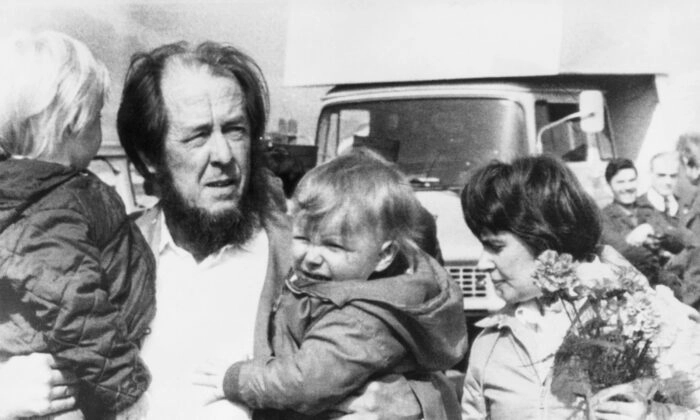One of the most important writers of the 20th century, Solzhenitsyn revealed to the world the crimes of the Soviet system.
“How easy for me to live with You, O Lord! How easy for me to believe in You!” The believer Alexander Isayevich Solzhenitsyn, had every reason not to believe: poverty in childhood, the front lines in Hitler’s war, arrest, torture, imprisonment, hard labor, cancer, persecution and humiliation. All these were the birth pains of his faith and the catalyst of his great literary works.
He was born on Dec. 11, 1918, in Northwest Russia, and raised in the Russian Orthodox religion, a crime in the Soviet state. Government schooling and a science degree fashioned him into an atheist for a time, but only a time.
A gradual return to spiritual ways began during his trials in the Russian army and his arrest for slandering Stalin in a letter to a friend. The penalty was eight years in prison camps, virtually a death sentence by overwork and starvation.
The shadow—and the light—of these eight life-changing years fell upon his entire literary output, and although he wrote in a journalistic style he was in truth, a poet, and a prophet.
‘The Gulag Archipelago’
“The Gulag Archipelago,” his most important work, is a tale of cruelties inflicted on prisoners in the Soviet penal system. It is a masterpiece of reporting, but, more significantly, it is a narrative of the struggle to come to terms with injustice and the desperate battle to stay alive.
Much has been written about the effects of brutality on the prisoners, how they were turned into beasts, but the few who were not seem to be passed by unnoticed. One thinks of the many pinecones falling to the ground in a forest, and the few that germinate and grow into stately trees. “I am not going to examine those countless cases of evil here. They are well known to everyone,” Solzhenitsyn wrote.
He observed that one inmate, who ardently preached that camp life can only corrupt, was not himself corrupted: He wouldn’t betray his fellow prisoners for an extra piece of bread or a shorter sentence. This man disproved his own claim. Most incorruptible were the truly religious people, “their self-confident procession through the camp—a sort of silent religious procession with invisible candles.”
His two most notable works of fiction are the novels, “The First Circle,” and “One Day in the Life of Ivan Denisovich,” a synthesis of characters and events from his prison days.









